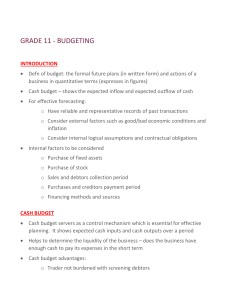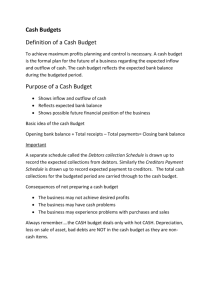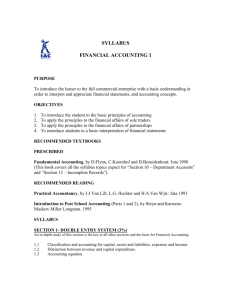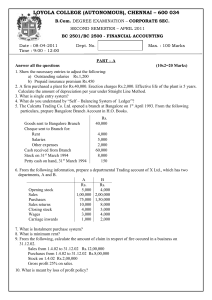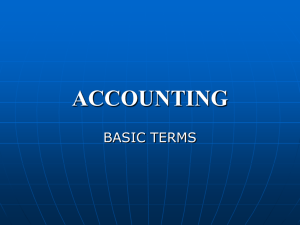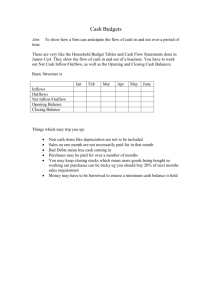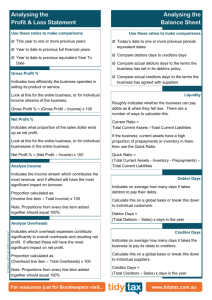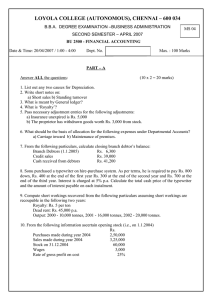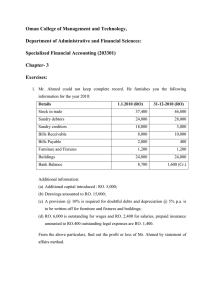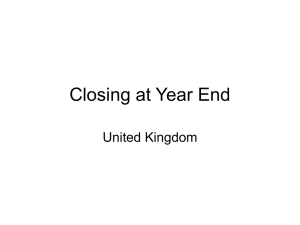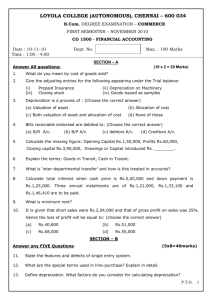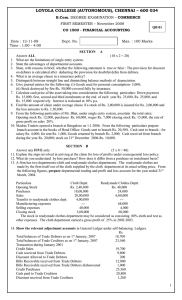co 1502 - financial accounting
advertisement
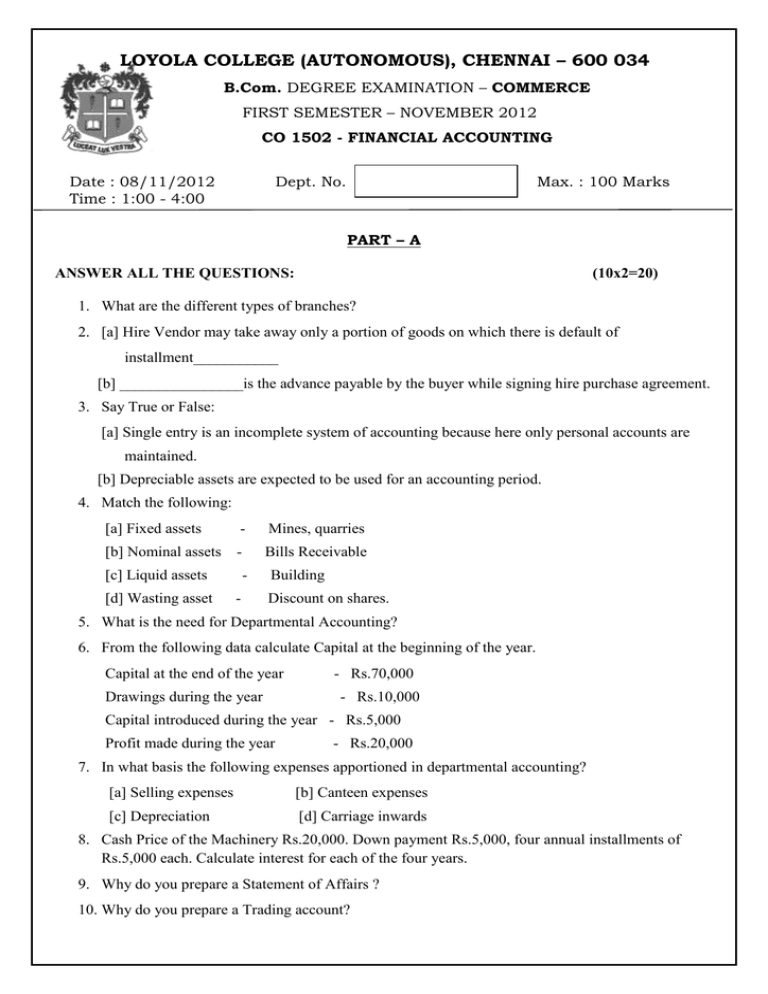
LOYOLA COLLEGE (AUTONOMOUS), CHENNAI – 600 034 B.Com. DEGREE EXAMINATION – COMMERCE FIRST SEMESTER – NOVEMBER 2012 CO 1502 - FINANCIAL ACCOUNTING Date : 08/11/2012 Time : 1:00 - 4:00 Dept. No. Max. : 100 Marks PART – A ANSWER ALL THE QUESTIONS: (10x2=20) 1. What are the different types of branches? 2. [a] Hire Vendor may take away only a portion of goods on which there is default of installment___________ [b] ________________is the advance payable by the buyer while signing hire purchase agreement. 3. Say True or False: [a] Single entry is an incomplete system of accounting because here only personal accounts are maintained. [b] Depreciable assets are expected to be used for an accounting period. 4. Match the following: [a] Fixed assets - Mines, quarries [b] Nominal assets - Bills Receivable [c] Liquid assets [d] Wasting asset - Building Discount on shares. 5. What is the need for Departmental Accounting? 6. From the following data calculate Capital at the beginning of the year. Capital at the end of the year Drawings during the year - Rs.70,000 - Rs.10,000 Capital introduced during the year - Rs.5,000 Profit made during the year - Rs.20,000 7. In what basis the following expenses apportioned in departmental accounting? [a] Selling expenses [b] Canteen expenses [c] Depreciation [d] Carriage inwards 8. Cash Price of the Machinery Rs.20,000. Down payment Rs.5,000, four annual installments of Rs.5,000 each. Calculate interest for each of the four years. 9. Why do you prepare a Statement of Affairs ? 10. Why do you prepare a Trading account? PART – B Answer any FIVE questions: (5 x 8 = 40 marks) 11. State the various methods of depreciation. 12. Distinguish between Statement of Affairs and Balance Sheet. 13. Define HRA. Enumerate the advantages of HRA. 14. On 01.01.2002, X purchased a machine for Rs.50,000. On 01.07.2003 additions were made for Rs.10,000. On 01.04.2004, Rs.6,400 worth of additions were made. On 31.12.2004, 1/4th of the first machine purchased on 01.01.2002 was sold for Rs.7,000. Show machinery account from 2002 to 2004 in the books of X under diminishing balance method at 10% per annum. 15. From the following details, prepare Departmental Account: Particulars Department A Rs. Department B Rs. Opening stock 9,000 8,400 Total Purchases 27,000 21,600 Total sales 42,000 36,000 Closing stock 10,800 4,800 Credit purchases 17,000 10,600 5,000 6,000 Credit sales Transfer of goods from Departments A to B Rs.4,000 Transfer of services from Departments B to A Rs.500 16. The Calcutta Commercial Company invoiced goods to its Jamshedpur Branch at cost. The Head Office paid all the expenses from its bank except petty cash expenses which were paid by the branch. From the following details relating to the Branch, prepare, 1) Branch stock A/c 2) Branch Debtors A/c 3) Branch Expenses A/c 4) Branch P&L A/c Stock ( Opening ) Debtors ( Opening ) Petty cash ( Opening ) Goods sent from HO Goods returned to HO Cash sales Advertisement Cash received from Debtors Stock ( Closing ) Allowance to customers Rs 21,000 37,800 600 78,000 3,000 52,500 2,400 85,500 19,500 600 Discount to customers Bad debts Goods returned to branch by customers Salaries & Wages Rent & Rates Debtors(Closing) Petty cash ( Closing ) Credit sales Rs 4,200 1,800 1,500 18,600 3,600 29,400 300 85,200 17. From the following information calculate credit purchases and total purchases: Rs. Cash purchases 29,000 Opening balance of bills payable 7,500 Opening balance of creditors 20,000 Closing balance of Bills payable 2,500 Closing balance of creditors 18,000 Cash paid to creditors 25,000 Cash paid to bills payable in the relevant year 10,500 Purchase returns 1,500 Allowance from creditors 800 Bills payable dishonoured 300 18. From the following information you are required to ascertain [a] cost of sales [b] Closing inventory as per CPP method, when the firm follows LIFO method for inventory valuation. Inventory on 1/4/1996 Rs.1,20,000 Purchases during 1996 - 97 Rs.72,000 Inventory on 31/3/1997 Rs.1,80,000 The firm has decided to adopt retail price index which was as follows: On 1/4/1996 = 100; on 31/3/1997 = 140; Average during 1996 – 97 =125 PART – C Answer any TWO questions: (2 x 20 = 40 marks) 19. Raja maintains his books under Single Entry system . From the following information prepare Trading Profit and Loss A/c for the year ending 31.12.1991 and also Balance sheet as on that date. Cash in hand on 01.01.1991 was Rs.4,250. Asset and Liabilities 1.1.1991 31.12.1991 Debtors 16,300 21,250 Stock 8,330 11,220 Furniture 850 850 Creditors 5,100 3,780 Other transactions: Cash received from debtors Cash paid to creditors Salaries Rent & Rates Other expenses Drawings Additional capital Adjustments: 52,680 37,400 10,200 1,275 1,530 2,550 1,700 Cash sales Cash Purchases Discount received Discount allowed Returns inward Returns outward Bad debts 1,275 4,250 595 255 850 680 170 Write off depreciation @5% on furniture. Provide doubtful debts @ 1% on debtors. 20. Kevin purchased a truck for Rs.1,60,000 from Pranesh on 1.1.93 payment to be made Rs.40,000 down,Rs.46,000 at the end of first year, Rs.44,000 at the end of second year and Rs.42,000 at the end of third year. Interest was charged at 5% and Kevin depreciates the truck at 10% per annum on written down method. Kevin, after having paid down payment and first installment at the end of first year, could not pay second installment. The seller took possession of the truck and after spending Rs.4,000 on repairs of the asset, sold it away for Rs.91,500. Give journal entries and ledger accounts in the books of both parties. 21. From the following trial balance as on 31.12.2000 prepare Trading, Profit and Loss Account and a Balance Sheet as on that date. Particulars Stock as on 01.01.2000 Cash in hand Drawings Rent Machinery Tax Provision for bad debts Bad debts Capital Interest General Expenses Bank overdraft Purchases Debtors Sales Creditors Sales return Purchase return Debit Rs. Credit Rs. 5,840 192 2,840 480 3,800 600 420 888 17,000 320 1,760 960 41,448 16,800 47,624 8,000 840 1,164 75,488 Adjustments: a) Depreciation on machinery 10% p.a b) Rent outstanding Rs.500 c) Tax prepaid Rs.100 d) Provision for bad debts is to be increased to 5% on debtors e) Closing stock Rs.3,500. 22. Discuss the Social Responsibility Accounting in detail. $$$$$$$ 75,488
